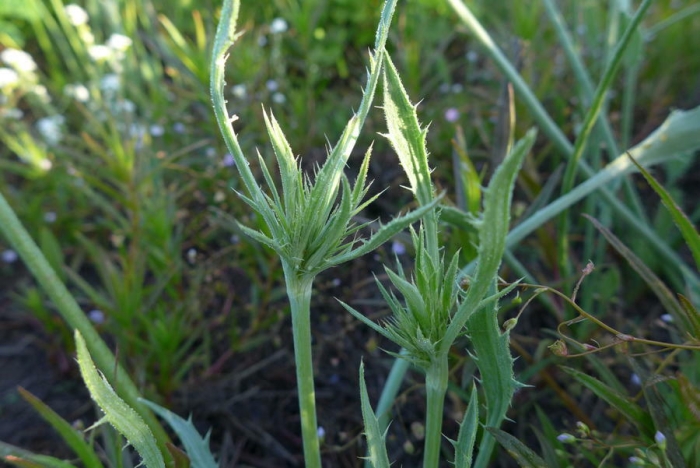Coastal Eryngo
(Eryngium petiolatum)
Coastal Eryngo (Eryngium petiolatum)
/
/

© Don Boucher
CC BY 4.0
Image By:
© Don Boucher
Recorded By:
Copyright:
CC BY 4.0
Copyright Notice:
Photo by: © Don Boucher | License Type: CC BY 4.0 | License URL: http://creativecommons.org/licenses/by/4.0/ | Uploader: neighborhood-naturalist | Publisher: iNaturalist |



















Estimated Native Range
Summary
Eryngium petiolatum, commonly known as Coastal Eryngo, is a perennial herb native to the coastal prairies and meadows of the Pacific Northwest, including Oregon and Washington. It is a member of the Apiaceae family and is characterized by its striking blue to steely gray flowers and spiny, collared leaves. Coastal Eryngo typically grows to a height of 2 to 4 feet (0.6 to 1.2 meters) and spreads about 1 to 2 feet (0.3 to 0.6 meters). The plant blooms from mid to late summer, with its thistle-like flowers attracting pollinators such as bees and butterflies.
Coastal Eryngo is valued for its drought tolerance and unique floral display, making it a popular choice for xeriscaping, wildlife gardens, and coastal restoration projects. It is also used in cut flower arrangements due to its long-lasting blooms. This plant prefers full sun exposure and thrives in sandy, well-drained soils. While it is generally low-maintenance, it may require some protection from slugs and snails, which can damage the foliage. Coastal Eryngo is not known to have aggressive roots or significant disease problems, but it can be sensitive to overwatering and poor drainage.CC BY-SA 4.0
Coastal Eryngo is valued for its drought tolerance and unique floral display, making it a popular choice for xeriscaping, wildlife gardens, and coastal restoration projects. It is also used in cut flower arrangements due to its long-lasting blooms. This plant prefers full sun exposure and thrives in sandy, well-drained soils. While it is generally low-maintenance, it may require some protection from slugs and snails, which can damage the foliage. Coastal Eryngo is not known to have aggressive roots or significant disease problems, but it can be sensitive to overwatering and poor drainage.CC BY-SA 4.0
Plant Description
- Plant Type: Herb
- Height: 1.5-3 feet
- Width: 1-2 feet
- Growth Rate: Moderate
- Flower Color: Purple, White
- Flowering Season: Summer
- Leaf Retention: Deciduous
Growth Requirements
- Sun: Full Sun, Part Shade
- Water: Medium
- Drainage: Medium
Common Uses
Bee Garden, Bird Garden, Butterfly Garden, Deer Resistant, Erosion Control, Low Maintenance, Water Garden
Natural Habitat
Native to coastal prairies and meadows of the Pacific Northwest
Other Names
Common Names: Leafy Sea Holly, Button Snakeroot, Petiolate Eryngo
Scientific Names: , Eryngium petiolatum, Eryngium aquaticum, Eryngium petiolatum var. juncifolium,
GBIF Accepted Name: